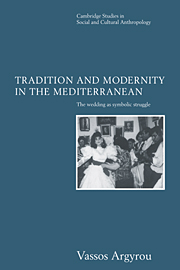Book contents
- Frontmatter
- Contents
- List of illustrations
- Acknowledgments
- Introduction
- 1 The island of Aphrodite
- 2 Nationalism and the poverty of imagination
- 3 The weddings of the 1930s
- 4 The meaning of change
- 5 Distinction and symbolic class struggle
- 6 Anthropology and the specter of “monoculture”
- 7 The dialectics of symbolic domination
- Appendix
- Notes
- References
- Index
- Cambridge Studies in Social and Cultural Anthropology
2 - Nationalism and the poverty of imagination
Published online by Cambridge University Press: 25 August 2009
- Frontmatter
- Contents
- List of illustrations
- Acknowledgments
- Introduction
- 1 The island of Aphrodite
- 2 Nationalism and the poverty of imagination
- 3 The weddings of the 1930s
- 4 The meaning of change
- 5 Distinction and symbolic class struggle
- 6 Anthropology and the specter of “monoculture”
- 7 The dialectics of symbolic domination
- Appendix
- Notes
- References
- Index
- Cambridge Studies in Social and Cultural Anthropology
Summary
In a recent influential book (Anderson 1991), nationalism is portrayed as a figment of the imagination – thinking of one's self as a member of a community whose other members one does not even know. Greek Cypriots number only 600,000 souls and seem to know one another to a far greater extent than people in other, larger countries. Nonetheless, they too imagine, and their imagination is both complex and impoverished. It is complex, one might even say vivid, because it transcends not only geographical but also temporal boundaries. And it is impoverished because it has proved self-defeating.
As is well known, Anderson (1991) argues that nationalism became possible when people ceased to imagine themselves as members of communities that lay beyond their geographical boundaries. Religion, for instance, had made it possible for people as far apart as, say, Pakistan and Morocco to think of themselves as members of the same (Islamic) community and in this way prevented the forging of a Pakistani or a Moroccan national consciousness. In this chapter I want to argue that Greek Cypriot nationalism cannot be understood outside the context of a wider hegemonic identity – a new religion – what Cypriots variably call I Evropi (Europe), I Dhisi (the West), or alternatively O politismenos kosmos (the civilized world). In an ironic reversal of Anderson's thesis, then, it is largely because they imagine themselves as members of a wider community – Europe – that Cypriots think of themselves as being Greek.
- Type
- Chapter
- Information
- Tradition and Modernity in the MediterraneanThe Wedding as Symbolic Struggle, pp. 38 - 59Publisher: Cambridge University PressPrint publication year: 1996

